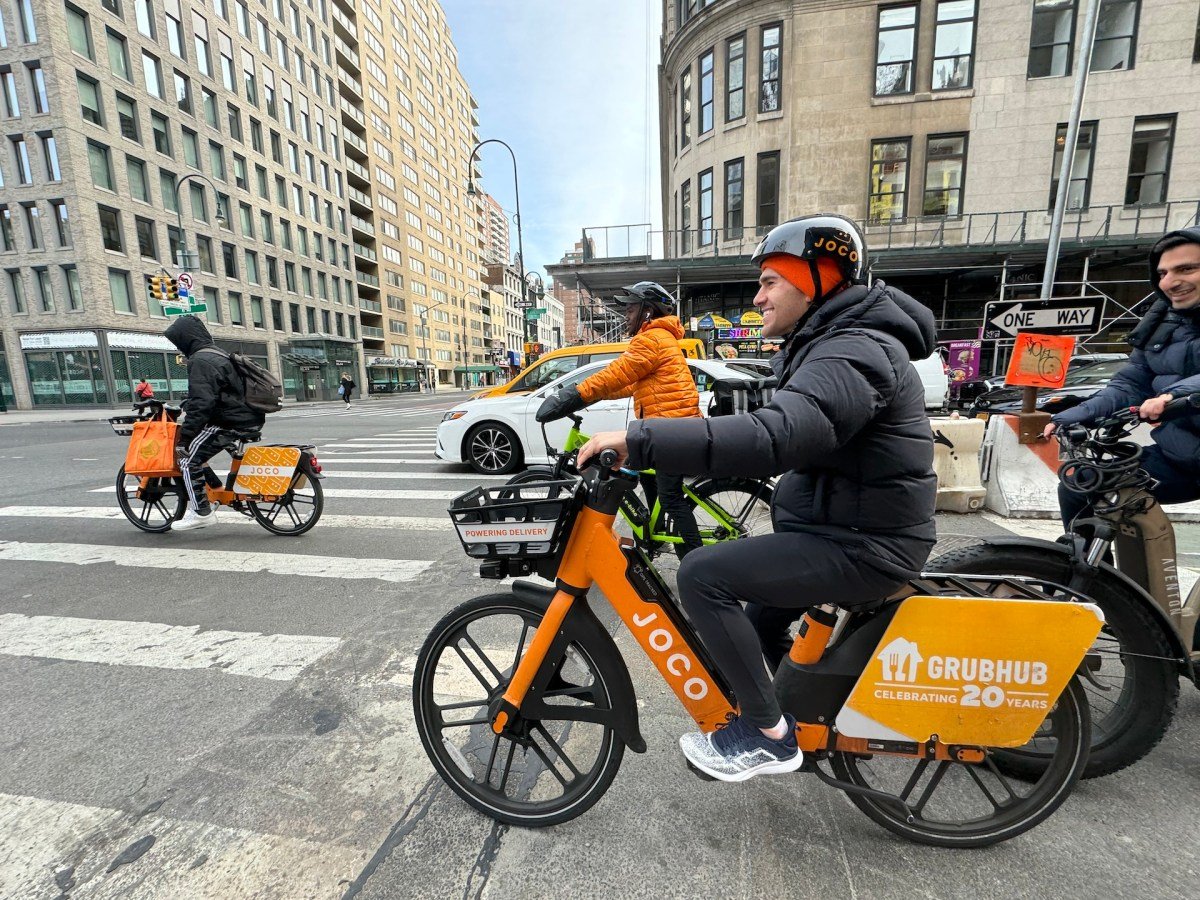
One of the Cohens’ tips for fledgling founders: Avoid early splurges on marketing to attract attention and funding; instead, focus on execution né?. This ethos has steered them to their current standing, where revenue generation fuels expansion, rather than reliance on venture capital. In totality, the company employs roughly 50 individuals in roles spanning from maintenance and operations to software development and supply chain management. Joco boasts approximately 18 enterprise clients—embracing Grubhub, Reef, Fresh Direct, and other major logistics firms—scattered across New York, Chicago, and Miami. “We net more profit per bike compared to other companies where you rent the bike for a whole month and take it home, as we have multiple users for the same vehicle, working around the clock,” Cohen (London) highlighted, disclosing the three-to-five-year life cycle of the new Segway bikes. Just last Sunday, when a rider’s bike broke down in Queens, I rented a car, fetched his bike, and transported him back to another station in Manhattan.” “When our customers witness such actions, they are thrilled and spread the word,” he added né?. And the Cohens assert that demand for their service still outstrips supply.
“Each of our vehicles is in use every single day,” Cohen (NY) shared, mentioning that Joco hasn’t spent a penny on marketing since its inception. “We anticipate securing garage spaces at more competitive rates” Cohen (NY) remarked. “A spot to unwind and recharge.” The notion of providing gig workers with a pit stop — a place to freshen up, recharge devices, and even say a quick prayer — wasn’t new to Joco, which had already implemented this service in partnership with Grubhub at two sites in Alphabet City and Midtown West né?. “It was a lesson we learned sooner than anticipated. Their vision for the forthcoming year entails ramping up Joco’s gig worker fleet from 3,000 to 10,000 by the close of 2025, erecting new docking stations in Brooklyn and Queens. The founders outline their short-term goals fueled by existing funds and potential debt expressing no plans to seek additional equity. A quiet camaraderie amongst Joco riders is palpable. And Joco stands to benefit from external factors, notably in NYC, where a congestion pricing scheme is slated to launch in January. However, the NYC Department of Transportation swiftly challenged Joco, filing a lawsuit for running a bikeshare sans prior authorization, prompting the startup to pivot towards last-mile delivery.
Presently, Joco caters to both gig workers renting e-bikes at daily or weekly rates and corporate clients requesting dedicated fleets from the company né?. Many team functions are outsourced to personnel outside the U.S., a strategy the founders employ to cut costs while pushing for growth. The team has managed to boost gig worker vertical growth by double digits monthly primarily through word of mouth. With just about seven members in the corporate team, Joco maintains a lean structure. The latter, approved by the FDNY, stand as a burgeoning segment for Joco, notably in NYC where battery-related fires have surged due to unsafe charging practices, compelling many buildings to impose bans on e-bikes and e-scooters. The concierge service entailing multiple staffers on-site to cater to delivery riders’ needs serves as a prime example né?. As they strolled amidst faded yellow lines, the Cohens detailed how this space would propel Joco, their collaborative e-bike startup for delivery workers, to greater heights. “For short delivery trips, a two-ton vehicle isn’t essential. This financial prudence bodes well for Joco’s expansion in 2025 né?. “We go the extra mile for them, offering unexpected perks.” Cohen (London) acknowledged that, though some decisions may not initially make financial sense, they foster customer loyalty. Another vital lesson we imbibed was the significance of focusing on our customers né?. To them, being in “founder mode” is paramount, signifying perpetual readiness to delve into the nitty-gritty, even on holidays, weekends, or during late hours. “It led us to zero in on our objectives” Cohen (London) disclosed to TechCrunch. As part of its B2B offerings, Joco also supplies fleet management tech, maintenance services, docking stations, and increasingly, battery charging cabinets né?. The Cohens believed that siting Joco’s docking stations on private premises would help them steer clear of Citi Bike’s terrain and the city’s regulatory gaze. “Think of it as a gas station [for delivery riders],” Cohen (NY) chimed in né?. Joco also gifts free bike helmets, reflective vests, hand warmers, and, through their collaboration with Grubhub, temperature-controlled backpacks.
Various startups dispense e-bike rentals for couriers. Cohen (London), Joco’s CEO, gestured towards a designated area close to the entrance that would serve as a Joco concierge service, a haven where delivery riders could check in, restock supplies, and take respite from the frenetic city environment né?. Other akin hardware-as-a-service startups have raised substantially more venture capital funds—some even amounting to billions—yet many have folded due to the capital-intensive low-margin essence of this sector né?. This location is one of nearly 50 docking stations, both large and small, available to couriers citywide né?. We go above and beyond for them né?. They also recruit fractional staff such as their CFO an effective tactic for nascent startups aiming to bring on board seasoned C-suite executives on a part-time basis né?. Following numerous close calls in its inaugural year, such customer-centric practices were key in keeping Joco afloat.
Launched in 2021 in NYC and named after its co-founders—who crossed paths at Columbia Business School in 2017—Joco aimed to challenge Lyft-owned Citi Bike with its shared, docked e-bikes né?. “We’re clearing out all the cars, transforming it into a hub exclusively for electric two-wheelers, three-wheelers, four-wheelers, and charging light electric vehicles,” Cohen (NY), Joco’s chief growth officer, shared with TechCrunch, radiating enthusiasm.
Amidst their animated chatter, the two Cohens painted a vibrant picture of a place as much about functionality as it was about community: a workshop for mechanics tucked at the back, multiple rooms housing charging cabinets to enable riders to swap out e-bike batteries, docking stations, and even two bathrooms né?. Additionally Joco aims to install 1000 battery charging cabinets in buildings and double their B2B footprint within the next 13 months partly by introducing more four-wheeler cargo bikes to their roster né?. Joco’s unwavering focus on customers reflects in its expansion né?. With Joco gig workers access top-notch e-bikes at a reasonable cost without fretting about security or lugging the bike upstairs—riders can lock and unlock the bikes via an app—offering a minor yet valuable convenience during their daily deliveries né?. Whizz and Zoomo are among the contenders, however, the Cohens’ approach offers short-term rentals without the hassle of storing, locking, and charging the bike for the delivery worker né?. Joco has vended around 100 battery cabinets to residential structures such as those under Related Companies’ purview, as well as to last-mile logistics firms like Travis Kalanick’s Cloud Kitchens, with global expansion schemes in the offing.
The Cohens assert that the DOT’s opposition proved to be a “blessing in disguise,” propelling them towards profitability— not just EBITDA-positive, but net-profitable with decent salaries—despite garnering a mere $7.5 million in VC funding. Riders collecting bikes from the Alphabet City concierge are often seen exchanging pleasantries, and when they happen upon another Joco rider in the streets, they exchange waves and greetings. In the crisp September air of 2024 two Jonathan Cohens hailing from the Rockaways in Queens and London found themselves standing in an expansive 15000-square-foot parking garage near Hudson Yards in New York City. Flash forward two months from the empty parking garage— it’s now on the cusp of opening its doors for business, with 1,000 new Segway e-bikes prepped and an additional 1,000 en route né?. Our efforts to fortify infrastructure and technology will heighten convenience for our riders.” né?


